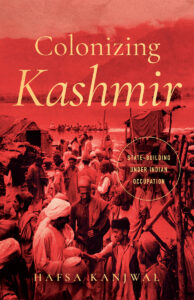Book studies the decade-long rule of Bakshi Ghulam Mohammad—second prime minister of the State of Jammu and Kashmir—and examines the intentions, tensions, and unintended consequences of his state-building policies in the context of India’s colonial occupation
 Hafsa Kanjwal, assistant professor of history
Hafsa Kanjwal, assistant professor of history
Colonizing Kashmir: State-Building Under Indian Occupation
Released July 25, 2023
Colonizing Kashmir, a summary:
The Indian government, touted as the world’s largest democracy, often repeats that Jammu and Kashmir—its only Muslim-majority state—is ‘an integral part of India.’ The region, which is disputed between India and Pakistan and is considered the world’s most militarized zone, has been occupied by India for over 75 years. Colonizing Kashmir interrogates how Muslim-majority Kashmir was made ‘integral’ to India through a study of the decade-long rule (1953-1963) of Bakshi Ghulam Mohammad, the second prime minister of the State of Jammu and Kashmir. Drawing upon a wide array of bureaucratic documents, propaganda materials, memoirs, literary sources, and oral interviews in English, Urdu, and Kashmiri, I examine the intentions, tensions, and unintended consequences of Bakshi’s state-building policies in the context of India’s colonial occupation. I reveal how the Kashmir government tailored its policies to integrate Kashmir’s Muslims into the Indian nation while also showing how these policies were marked by inter-religious tension, corruption, and political repression. Challenging the binaries of colonial and postcolonial, I historicize India’s occupation of Kashmir through processes of emotional integration, development, normalization, and empowerment to highlight the new hierarchies of power and domination that emerged in the aftermath of decolonization. In doing so, I question triumphalist narratives of India’s state-formation as well as the sovereignty claims of the modern nation-state.
 Where is it available?
Where is it available?
The book is available in paperback, hardcover, and Kindle/ebook editions, and it can be purchased on the Stanford University Press website (20% off with code KANJWAL20) as well as on major online retail sites such as Amazon and Target.
Why did you write this book, and why should people at Lafayette and beyond read it?
The book challenges how we often think about colonialism. India is an interesting case study because it is often valorized for its own anti-colonial movement, and yet, immediately after independence, it set about on a colonial project of its own, denying the people of Kashmir their right to sovereignty. I am hoping to challenge this idea that there are colonial states on the one hand, and postcolonial nation-states on the other, which have been ‘decolonized.’ I think there are a number of places in the world that are like Kashmir, which do not fit so neatly into contemporary nation-states and have been subject to ongoing forms of colonization and occupation. They are often forgotten about or ignored, and their histories are written by their colonizers. I wrote this book in an attempt to challenge how we see these places, and to highlight how colonization can happen through different modalities of control, including development and secularism.
How will this research impact your work and/or classroom at Lafayette?
I hope to incorporate this book into my existing courses on History of the Modern World, Modern South Asia, and Islam in the Modern World. I am currently writing a more general history of modern Kashmir, and many of the insights of this book will help guide my second book project.
Is there anything else we should know?
I will be speaking about the book at a number of campuses this upcoming academic year, including in New York City, the Bay Area, and the United Kingdom, which I am looking forward to. This book is coming out at a time when India’s colonial project in Kashmir has only intensified, especially under its current Hindu nationalist government. There is an immense attempt to silence Kashmiris in Kashmir, but also in the diaspora. I hope this book can contribute to ongoing conversations about Kashmir’s past, present, and future.
 Hafsa Kanjwal, assistant professor of history
Hafsa Kanjwal, assistant professor of history  Where is it available?
Where is it available?
